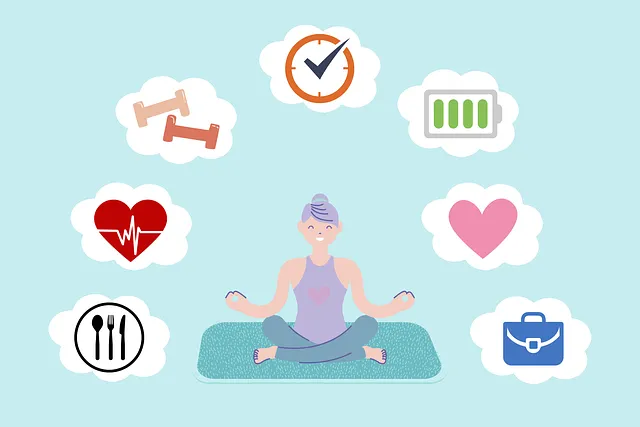Longmont Kaiser Permanente behavioral health services leads in mental well-being by promoting resilience through the RFM (Resilience, Flexibility, and Mastery) model. This framework equips individuals with self-efficacy, adaptability, and emotional balance to prevent depression and burnout. Their holistic approach includes innovative initiatives like Mental Wellness Coaching programs and public awareness campaigns, fostering robust self-care routines for a healthier work environment. The effectiveness of these resilience-building programs is measured through comprehensive evaluations tracking mental wellness improvements and coping abilities, ensuring tailored support for better emotional well-being.
Resilience is a powerful tool in navigating life’s challenges. RFM (Resourceful Living Model) offers a structured approach to building this resilience, focusing on emotional well-being and coping strategies. This article explores how Longmont Kaiser Permanente Behavioral Health Services integrates RFM into their programs, providing a comprehensive overview of its implementation and benefits. We’ll delve into specific exercises, measure success through evaluation, and uncover the impact of RFM on personal growth, all while highlighting the expertise of Longmont Kaiser Permanente behavioral health services.
- Understanding RFM and Its Role in Resilience Building
- Longmont Kaiser Permanente Behavioral Health Services: An Overview
- Implementing Resilience Exercises for Emotional Well-being
- Measuring Success: Evaluating the Impact of RFM Programs
Understanding RFM and Its Role in Resilience Building

Resilience is a key component in maintaining mental health and well-being, especially within demanding fields like healthcare. Longmont Kaiser Permanente behavioral health services recognize this and often incorporate resilience-building exercises into their programs. The RFM (Resilience, Flexibility, and Mastery) model is one such framework used to foster resilience. This approach focuses on helping individuals develop a deep sense of self-efficacy, adapt to challenging situations, and maintain emotional balance.
By understanding the RFM model, healthcare providers and those seeking mental health support can learn valuable tools for depression prevention and burnout prevention strategies. It encourages the creation of a robust self-care routine development for better mental health, allowing individuals to navigate life’s uncertainties with greater ease. This proactive approach not only benefits personal well-being but also contributes to a more sustainable and healthy work environment.
Longmont Kaiser Permanente Behavioral Health Services: An Overview

Longmont Kaiser Permanente Behavioral Health Services stands as a beacon of hope and healing in the healthcare landscape. This facility offers a comprehensive range of services designed to support both patients and healthcare providers navigating the challenges of mental health and wellness. Beyond traditional therapy and counseling, Longmont Kaiser Permanente focuses on innovative approaches such as burnout prevention strategies for healthcare providers, mental wellness coaching programs development, and public awareness campaigns development.
These initiatives reflect a deep commitment to fostering resilience and enhancing overall well-being within the healthcare community. By prioritizing mental health, the organization aims to create a supportive environment that not only prevents burnout but also encourages professionals to thrive in their roles. Through these comprehensive services, Longmont Kaiser Permanente Behavioral Health Services is transforming lives and redefining the standard of care in behavioral health.
Implementing Resilience Exercises for Emotional Well-being

Implementing Resilience Exercises for Emotional Well-being at Longmont Kaiser Permanente behavioral health services is a strategic approach to fostering mental wellness among individuals. These exercises are designed to help people develop coping mechanisms that enhance their ability to navigate life’s challenges and maintain a sense of emotional balance. By incorporating techniques such as mindfulness, stress management, and self-care practices, the behavioral health services at Longmont Kaiser Permanente aim to strengthen individuals’ resilience, ultimately leading to improved self-esteem and overall mental wellness.
The integration of resilience exercises goes beyond mere coping; it empowers individuals to take charge of their emotional well-being. This is particularly important for vulnerable populations who may be more susceptible to stress and anxiety. Through programs like Mental Wellness Coaching, Longmont Kaiser Permanente behavioral health services not only offer risk assessment for mental health professionals but also facilitate the development of comprehensive mental wellness coaching programs tailored to individual needs. Such initiatives contribute to a proactive approach in promoting emotional resilience and self-esteem improvement within the community.
Measuring Success: Evaluating the Impact of RFM Programs

The success of resilience-building programs like those offered by Longmont Kaiser Permanente behavioral health services is often measured by the positive changes in participants’ mental wellness and coping abilities. Through regular evaluations, it becomes possible to track individual progress and assess the overall impact of these initiatives. By focusing on enhancing coping skills development, these programs aim to equip individuals with effective strategies for managing stress, anxiety relief, and emotional challenges.
The evaluation process involves various tools and techniques tailored to assess mental wellness. This may include self-report measures, where participants reflect on their personal growth, as well as clinical assessments conducted by trained professionals. By comparing pre- and post-program data, researchers and counselors can identify key areas of improvement, ensuring that the RFM exercises are effectively addressing the needs of those seeking support for anxiety relief and overall mental wellness.
Resilience, a key component of emotional well-being, can be effectively cultivated through RFM (Recovery-Focused Management) exercises. As demonstrated by Longmont Kaiser Permanente Behavioral Health Services, integrating these practices into healthcare enhances recovery and overall mental health. By measuring the impact of RFM programs, we can ensure their effectiveness and continued development, ultimately fostering resilient individuals capable of navigating life’s challenges with greater ease.






